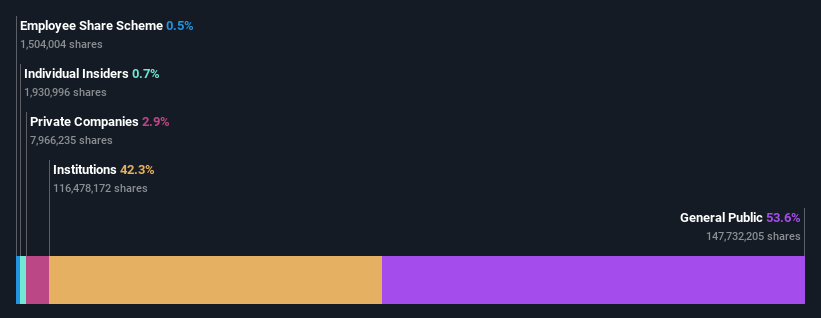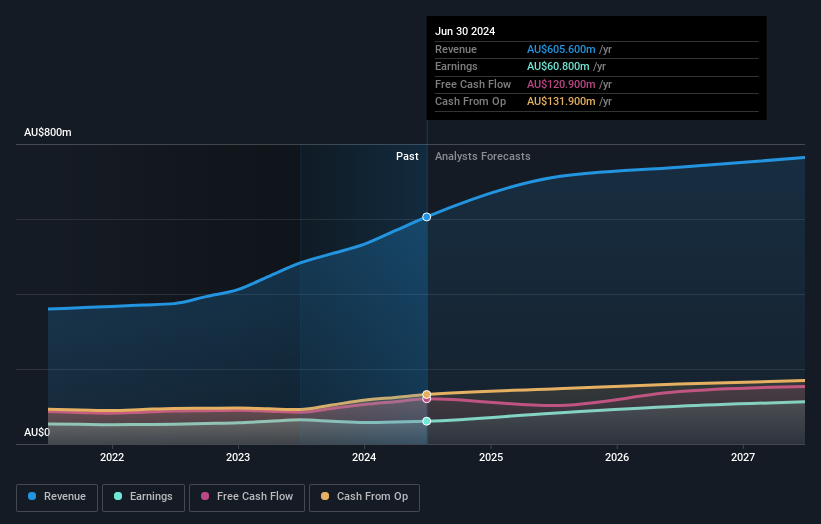- Australia
- /
- Professional Services
- /
- ASX:IPH
IPH Limited's (ASX:IPH) 5.6% loss last week hit both individual investors who own 54% as well as institutions

Key Insights
- IPH's significant retail investors ownership suggests that the key decisions are influenced by shareholders from the larger public
- 42% of the business is held by the top 25 shareholders
- Recent purchases by insiders
If you want to know who really controls IPH Limited (ASX:IPH), then you'll have to look at the makeup of its share registry. The group holding the most number of shares in the company, around 54% to be precise, is retail investors. Put another way, the group faces the maximum upside potential (or downside risk).
While the holdings of retail investors took a hit after last week’s 5.6% price drop, institutions with their 42% holdings also suffered.
Let's delve deeper into each type of owner of IPH, beginning with the chart below.
See our latest analysis for IPH

What Does The Institutional Ownership Tell Us About IPH?
Institutional investors commonly compare their own returns to the returns of a commonly followed index. So they generally do consider buying larger companies that are included in the relevant benchmark index.
As you can see, institutional investors have a fair amount of stake in IPH. This implies the analysts working for those institutions have looked at the stock and they like it. But just like anyone else, they could be wrong. It is not uncommon to see a big share price drop if two large institutional investors try to sell out of a stock at the same time. So it is worth checking the past earnings trajectory of IPH, (below). Of course, keep in mind that there are other factors to consider, too.

IPH is not owned by hedge funds. Looking at our data, we can see that the largest shareholder is UBS Asset Management AG with 5.7% of shares outstanding. For context, the second largest shareholder holds about 4.6% of the shares outstanding, followed by an ownership of 4.6% by the third-largest shareholder.
On studying our ownership data, we found that 25 of the top shareholders collectively own less than 50% of the share register, implying that no single individual has a majority interest.
While studying institutional ownership for a company can add value to your research, it is also a good practice to research analyst recommendations to get a deeper understand of a stock's expected performance. Quite a few analysts cover the stock, so you could look into forecast growth quite easily.
Insider Ownership Of IPH
The definition of company insiders can be subjective and does vary between jurisdictions. Our data reflects individual insiders, capturing board members at the very least. The company management answer to the board and the latter should represent the interests of shareholders. Notably, sometimes top-level managers are on the board themselves.
Most consider insider ownership a positive because it can indicate the board is well aligned with other shareholders. However, on some occasions too much power is concentrated within this group.
Our most recent data indicates that insiders own less than 1% of IPH Limited. However, it's possible that insiders might have an indirect interest through a more complex structure. It appears that the board holds about AU$10m worth of stock. This compares to a market capitalization of AU$1.5b. Many investors in smaller companies prefer to see the board more heavily invested. You can click here to see if those insiders have been buying or selling.
General Public Ownership
The general public -- including retail investors -- own 54% of IPH. This level of ownership gives investors from the wider public some power to sway key policy decisions such as board composition, executive compensation, and the dividend payout ratio.
Next Steps:
I find it very interesting to look at who exactly owns a company. But to truly gain insight, we need to consider other information, too. Be aware that IPH is showing 3 warning signs in our investment analysis , you should know about...
If you would prefer discover what analysts are predicting in terms of future growth, do not miss this free report on analyst forecasts.
NB: Figures in this article are calculated using data from the last twelve months, which refer to the 12-month period ending on the last date of the month the financial statement is dated. This may not be consistent with full year annual report figures.
New: AI Stock Screener & Alerts
Our new AI Stock Screener scans the market every day to uncover opportunities.
• Dividend Powerhouses (3%+ Yield)
• Undervalued Small Caps with Insider Buying
• High growth Tech and AI Companies
Or build your own from over 50 metrics.
Have feedback on this article? Concerned about the content? Get in touch with us directly. Alternatively, email editorial-team (at) simplywallst.com.
This article by Simply Wall St is general in nature. We provide commentary based on historical data and analyst forecasts only using an unbiased methodology and our articles are not intended to be financial advice. It does not constitute a recommendation to buy or sell any stock, and does not take account of your objectives, or your financial situation. We aim to bring you long-term focused analysis driven by fundamental data. Note that our analysis may not factor in the latest price-sensitive company announcements or qualitative material. Simply Wall St has no position in any stocks mentioned.
About ASX:IPH
Very undervalued with solid track record and pays a dividend.
Market Insights
Community Narratives





